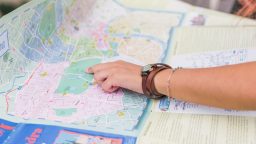Traveling is an exciting adventure, but it’s easy to fall into the trap of common mistakes that can make your trip less enjoyable. Whether you’re a seasoned traveller or a first-timer, avoiding these common travel blunders will help ensure your journey is smooth, memorable, and stress-free. Here are some of the most frequent travel mistakes and practical tips on how to avoid them.
- Overpacking Your Bags
One of the most common travel mistakes is overpacking. It’s tempting to bring every item you think you might need, but the reality is that most of the time, less is more. Overpacking means heavy luggage, unnecessary items, and the hassle of trying to manage too much stuff.
How to avoid it: Stick to a packing list and focus on versatile, lightweight items that can be mixed and matched. Pack only what you need and leave space for souvenirs or unexpected purchases. If you’re travelling to a warm climate, remember that you won’t need a winter coat or multiple pairs of shoes. Consider packing for a week and doing laundry during your trip to avoid lugging around a huge suitcase.
- Not Planning for Jet Lag
Jet lag is an inevitable part of long-haul flights, but many travellers fail to prepare for it, which can result in a few days of sluggishness and discomfort.
How to avoid it: Before your trip, try adjusting your sleep schedule to match the time zone of your destination a few days in advance. Drink plenty of water during your flight to stay hydrated, and avoid caffeine and alcohol, as they can worsen jet lag. Once you arrive, spend time outdoors in natural light to help reset your internal clock. Consider taking short naps instead of long ones to prevent feeling groggy later.
- Failing to Research the Destination Properly
Not doing enough research about the destination is a mistake that many travellers make. This could lead to missing out on must-see attractions, eating at overpriced tourist traps, or not knowing important cultural etiquette.
How to avoid it: Take the time to research your destination before you leave. Look up the best local restaurants, free attractions, and hidden gems. Read travel blogs and watch videos to get insider tips from people who have been there. Additionally, make sure you know the local customs and etiquette so you don’t accidentally offend anyone or make a social faux pas. Learning a few basic phrases in the local language can go a long way too.
- Not Having Travel Insurance
Some travellers skip travel insurance, thinking it’s an unnecessary expense. However, not having it can leave you vulnerable in case of an emergency, such as illness, lost luggage, or a flight cancellation.
How to avoid it: Always invest in comprehensive travel insurance before you leave. Look for a plan that covers trip cancellations, medical emergencies, lost baggage, and flight delays. It may seem like an added cost, but the peace of mind it provides is invaluable if something goes wrong during your trip. It’s better to have it and not need it than to need it and not have it.
- Relying Too Much on Technology
While technology can enhance your travel experience, it can also lead to problems if you become overly reliant on it. For example, relying solely on your phone for navigation can be frustrating if you run out of battery or lose signal. Additionally, relying on online reviews too heavily might not always lead you to the best experiences.
How to avoid it: Bring a physical map as a backup if you’re going to an area with limited cell service. Don’t forget to carry a portable charger for your phone or other devices. Also, try to enjoy the experience of being offline now and then – rather than scrolling through your phone for information or photos, take a moment to truly absorb the sights around you. Sometimes, disconnecting from technology is the best way to connect with the destination.
- Ignoring the Local Currency and Exchange Rates
Not understanding the local currency or exchange rates can lead to frustration and even overspending while you’re abroad. This is especially true in countries with high conversion rates, where you may not realise how much you’re paying for an item until you see the total in your own currency.
How to avoid it: Before your trip, research the exchange rate between your home currency and the local currency. Use a currency converter app to help you make quick calculations. Avoid exchanging money at airports or tourist hotspots, as these tend to have higher fees. It’s also a good idea to carry a small amount of local currency for emergencies, even if you plan to use a card most of the time.
- Not Checking Visa and Passport Requirements
Visa and passport issues can ruin your trip if not carefully considered. Some travellers forget to check the validity of their passports or are unaware of visa requirements for certain countries, leading to delays, extra fees, or even being denied entry at the border.
How to avoid it: Always check the visa and passport requirements for your destination well in advance. Make sure your passport has at least six months of validity left before your planned departure date. If you need a visa, apply for it early to avoid any last-minute stress. Some countries also require you to show proof of onward travel, so have a return or onward ticket booked just in case.
- Underestimating the Importance of Rest
When you’re travelling, it’s easy to get caught up in the excitement of sightseeing, trying new foods, and exploring every corner of a new city. But over-scheduling can lead to exhaustion and burnout, making the trip less enjoyable.
How to avoid it: Don’t forget to rest. It’s important to pace yourself and take breaks throughout the day. Build some downtime into your itinerary, whether it’s a relaxing afternoon at a café or a few hours spent lounging at the beach. Remember, the goal is to enjoy your trip – over-scheduling can lead to fatigue, which can take away from the experience.
- Not Booking Accommodation Early Enough
Booking accommodation at the last minute can lead to high prices, limited availability, or staying in a less-than-ideal location. Many travellers make the mistake of assuming they’ll always find a place to stay when they arrive, but this can often lead to disappointment.
How to avoid it: Book your accommodation well in advance, especially if you’re visiting popular destinations during peak seasons. Consider using hotel booking apps or websites to compare prices and find the best deals. If you’re travelling during peak tourist season, booking early will give you more options and help you secure the best rates.
Conclusion
While travel can be an exciting and rewarding experience, making a few simple mistakes can cause unnecessary stress or ruin your trip. By planning ahead, staying organised, and being mindful of the common blunders listed above, you can ensure that your journey is smooth, comfortable, and enjoyable. So, whether you’re a seasoned traveller or a first-timer, keep these tips in mind for a successful and unforgettable adventure. Safe travels!





